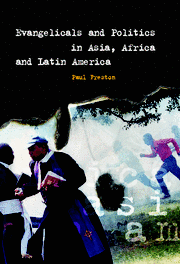Summary
The only country in Asia with a Christian majority, the Philippines have much in common with Latin America. This extends to evangelical politics, which probably need to be studied more in Latin American than in Asian terms. Spanish colonial heritage, Catholic majority, poverty, American influence in the twentieth century (more directly in the Philippines), dictatorship in the 1970s and 1980s, democracy now consolidating and a Protestant community between 7 per cent and 15 per cent – all this is similar to Latin America. Philippine Protestantism is medium-strength by Latin standards, and with a similar growth pattern.
There are, obviously, specificities. The South-East Asian location may in the end prove fundamental. The economy just might become a tiger, but there is far to go, especially after the Asian crisis of the late 1990s. The Filipino experience of dictatorship was more similar to the minority Latin model (Somoza in Nicaragua, Duvalier in Haiti) of a personal ruler clinging to power and being toppled by popular revolt, rather than to the majority Latin model of military dictatorships disengaging through negotiated transitions based on elite consensus (Thompson 1996). This contributed to the troubles of democratisation, with no fewer than eight coup attempts during the first democratic government. The Philippines is regarded as having one of the worst structural situations of the new democracies outside Africa.
- Type
- Chapter
- Information
- Publisher: Cambridge University PressPrint publication year: 2001



